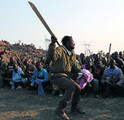
Striking miners at the Lonmin platinum mine in Marikana, North West, in August last year.
Violence related to labour and political issues was not dealt with properly at the dawn of democracy and is likely to continue being used as a means to voice unhappiness.
This was the view expressed at the International Security Studies (ISS) panel discussion on violence, unions and politics on Thursday.
Persistent labour unrest, which has hit the mining sector hardest but has also been seen in other sectors such as transport, has dented South Africa’s image and undermined investors’ confidence in the country as an investment destination. Labour woes were cited as one of the factors that led the rand to weaken sharply against the dollar in recent weeks.
Prof Steven Friedman, director of the Centre for the Study of Democracy at Rhodes University and the University of Johannesburg, said at the panel discussion that South Africa had made a fundamental mistake of thinking that a democratic dispensation would automatically usher in racial and political tolerance, and bring an end to the violent protests that had characterised the fight against the apartheid regime.
It would be business as usual, Prof Friedman said, with violence used every time people felt aggrieved, politically sidelined or inadequately catered for.
He said mining companies and the government were partly to blame for the Marikana protest last year, which led to the deaths of more than 40 people. They had abdicated their responsibility for social development and the welfare of workers after getting rid of the state-sanctioned migrant labour system, which had created the hostel system to accommodate mineworkers.
"That is why society is continuing as if democracy has not arrived to vent its frustration through violent protests and marches," his said.
"Remember that the inequality, unemployment and various forms of discrimination did not disappear when democracy was established. We must go back to address our society’s psyche, while we effectively deal with the societal ills of inequality and unemployment," he said.
He disputed the argument that violent protests had worsened in the past five to 10 years, saying the behaviour had been a norm for more than three decades, defining relations between races, between the apartheid police state and the African majority, and within communities.
PhD fellow at the University of Witwatersrand Crispen Chinguno said if the strikes in the mining sector had been handled by the National Union of Mineworkers (NUM), the particularly violent wildcat strikes seen in 2012 may have been averted.
He said South Africa was bound to see tension in the mining sector between rival unions "until one faction gives up".
Rivalry between the NUM and the Association of Mineworkers and Construction Union (Amcu), which has displaced the NUM at some mines, has been at the heart of violence in South Africa’s platinum belt in the past year-and-a-half.
Independent researcher David Bruce said political killings were one of the byproducts of the labour unrest in the mining sector.
"The killing of a whistle-blower might in some ways be a political killing," he said. "Conflict in the labour environment and even conflicts between gangs are sometimes manifestations of conflict between political groups."
Picture Source: THE TIMES
BY Hopewell Radebe and Khulekani Magubane
Source: Business Day
